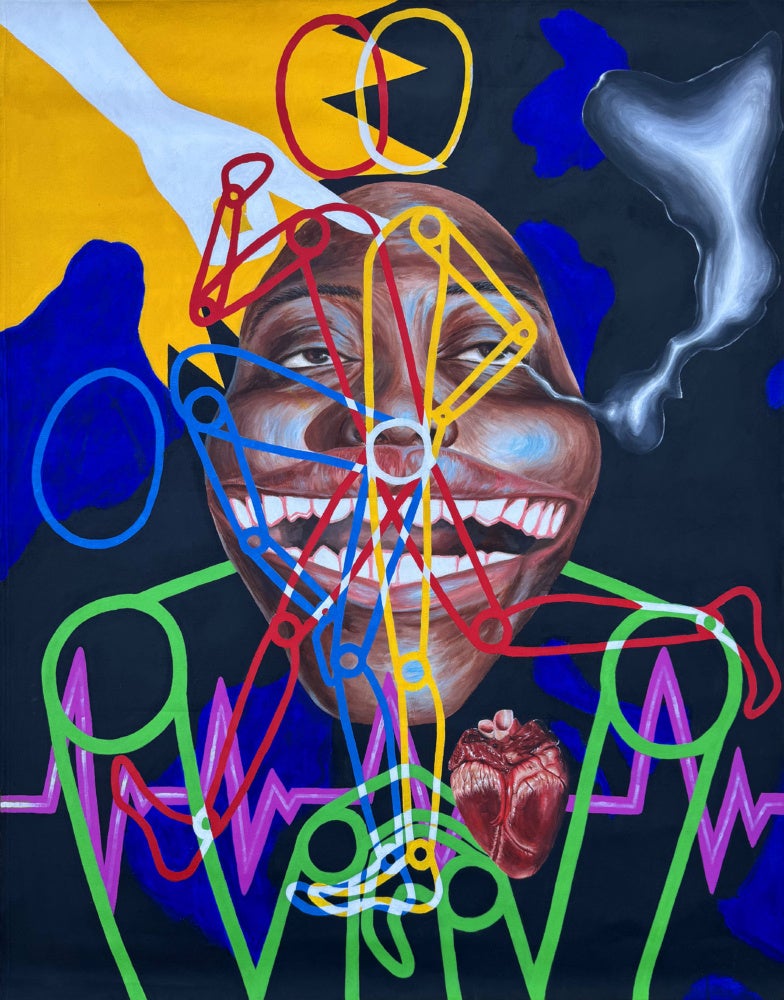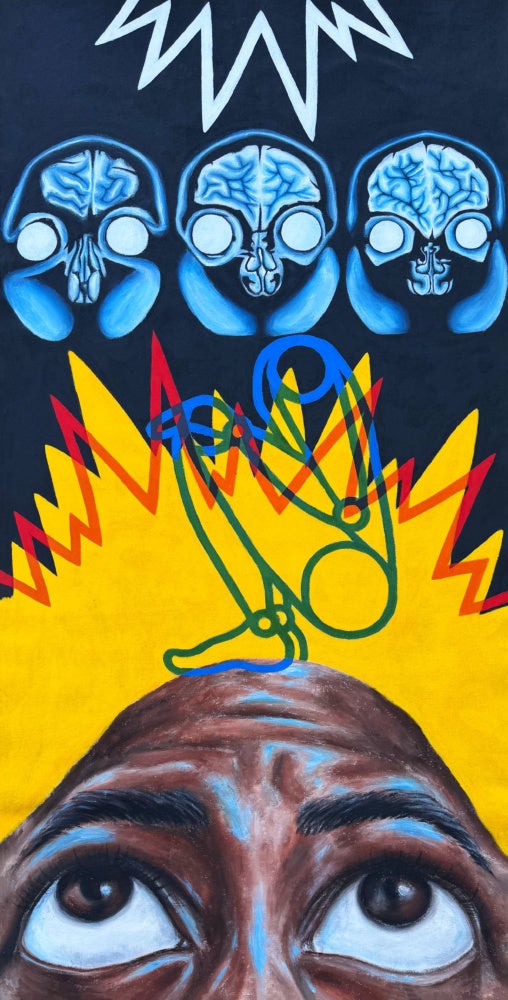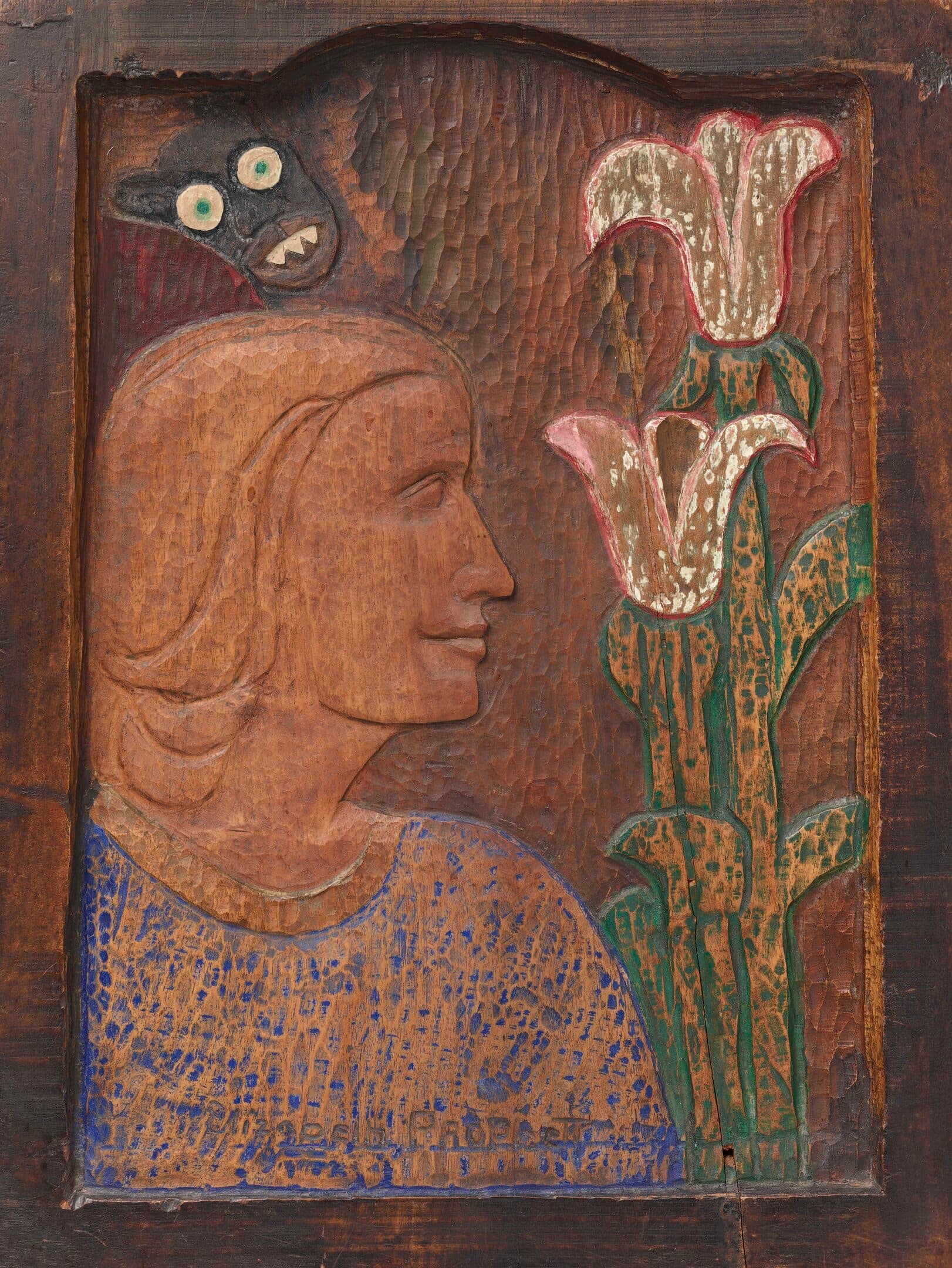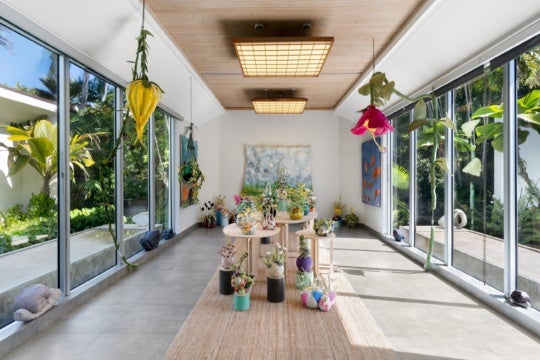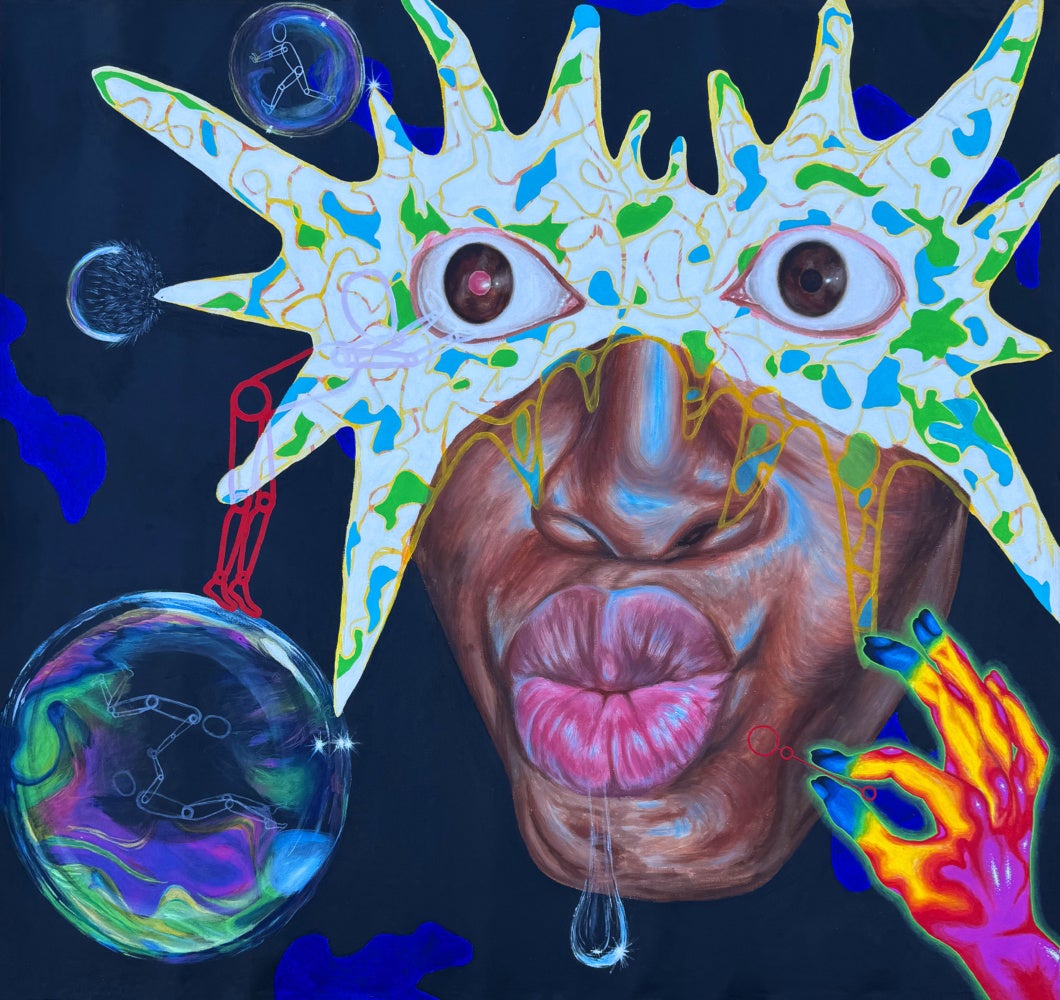
For Chechi Udumah, the surreal is the new real. In her bedroom studio in Atlanta, Georgia, Udumah creates layered, dreamlike pieces, utilizing surrealism to explore the relationship between the physical self and the invisible, subconscious self that she believes exists in everyone. I spoke with Udumah about authenticity, her layered creative process, and how there’s more to our reality than meets the eye.
This interview was originally published in print for the Atlanta Art Fair 2024 broadsheet publication, taking place from October 3 to 6, 2024.
Amina Daugherty: You use your own image as the focal point in many of your pieces, which gives your work an autobiographical tone. Can you tell me about the relationship between your physical and invisible selves and how you explore these concepts through your work?
Chechi Udumah: I explore my invisible self first through my writing process, where I like to just let my thoughts flow freely—like a stream of consciousness. I use this approach because it helps me to truly tap into my invisible self, accepting the ideas and visual inspiration that comes from it. The invisible self is my soul or my spirit. The act of creating is like a physical manifestation of my invisible self. All my work comes from this hidden part of me—it is about me, but at the same time, my work is relatable because it’s not too realistic. It’s my personal belief that everyone has an invisible self, like a spirit. I think that’s why my pieces speak to so many people. Some people might call it spirituality or something similar, but it’s more than that. It’s a whole experience that’s hard to put into words.
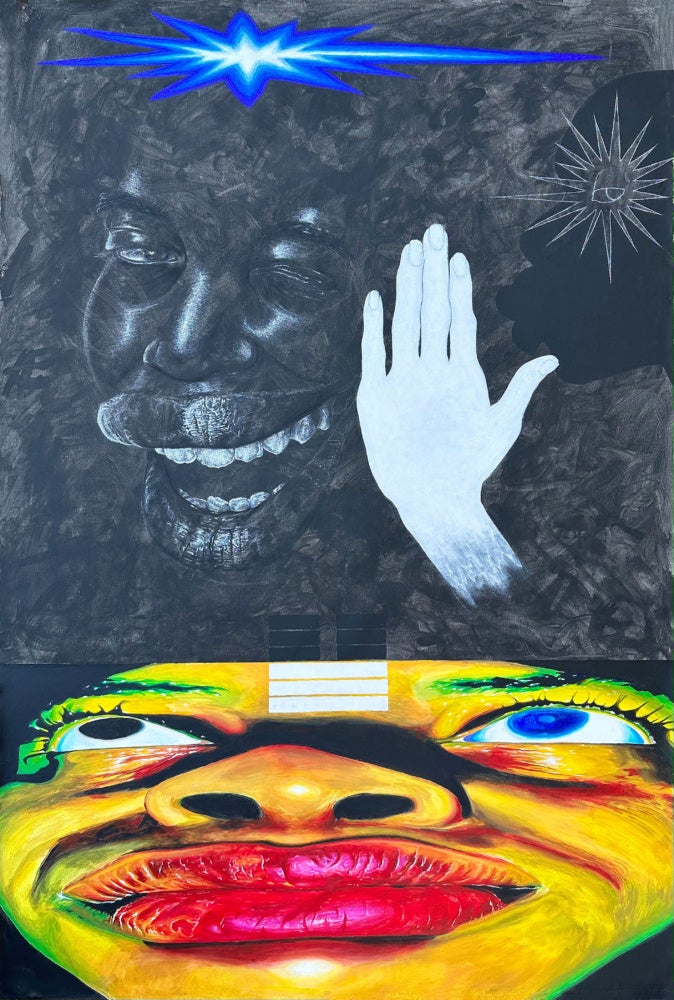
AD: Surrealism is a rebellion against tradition. It favors unmitigated expression over what is viewed as “realistic.” I admire your complete commitment to this rebellion. You obviously possess an understanding of realism, and yet you bend it at will into the surreal in order to tell the authentic story of the human experience. What makes this style more authentic than others?
CU: I intentionally play with lines and mix 2D and 3D elements to make it look like there’s more to the picture than meets the eye. It’s surreal to some, but to me, it’s just how I see reality. Think about it—nothing is as it seems, nothing is just surface level. There’s so much more to the world than what we can see. We have outer space, paranormal activity… Everything in this material world is made up of something that we can’t spot with the naked eye. I’m trying to make this idea apparent to others because I feel that, as a society, we are so caught up in what we think is “real” that we don’t think deeper about what is in front of us and what we are experiencing.
AD: You seem to have a very layered creative process that uses phrases and proverbs, writings and storytelling, inner exploration, etc. I see that layering in your work. Can you talk to me about that connection? How do you go about creating these layers of narrative and imagery in your pieces?
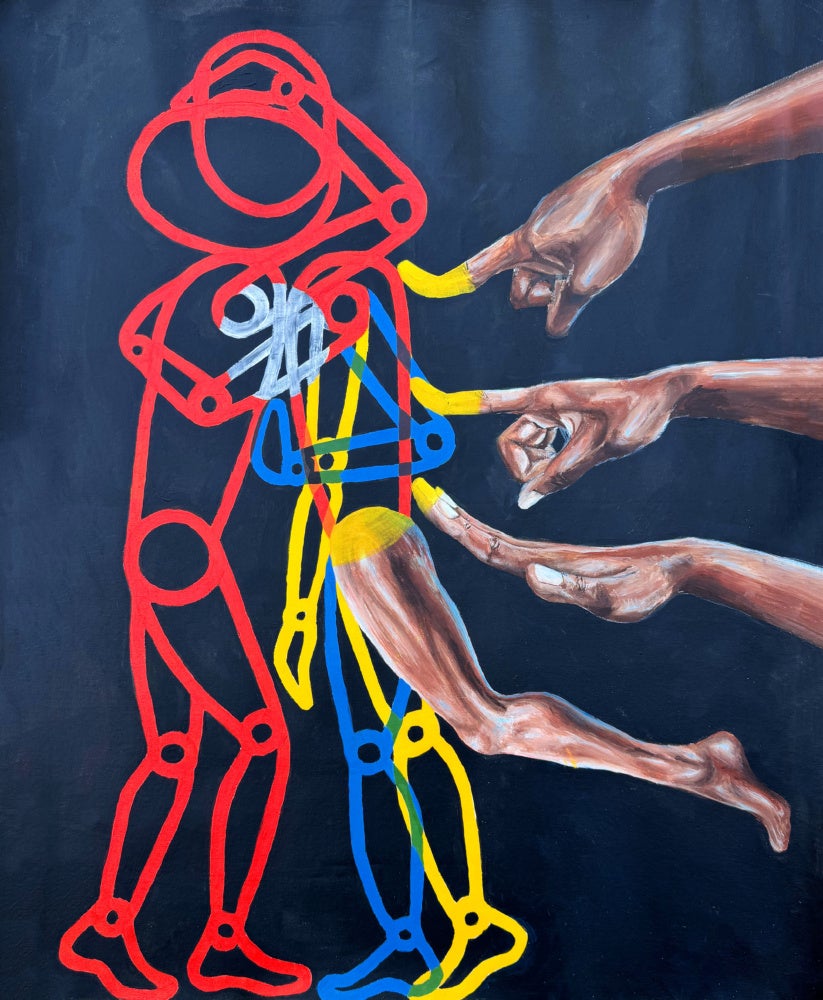
CU: When I was a child, I found it therapeutic to explore my mind by spending time in deep thought: writing, reading, solving puzzles, and doing any kind of creative activity. It was fun for me and taught me how to think critically.
Like I said before, everything for me starts with stream of consciousness writing; I use it to search my inner self, my mind, and my heart, and construct a story out of what I find there. Anything could come of it, for example, what seems like a random phrase is actually a metaphor for something we all experience in our shared reality. That then becomes an image in my work, something as simple as a heart or water becomes a symbol—everything in my work symbolizes something. Even a piece’s title will point to something in it that leads the viewer to connect the dots [of the narrative], and it now becomes a riddle or a puzzle for the viewer to solve. It’s all very intentional.
AD: Philosophical phrases and proverbs seem to be a major source of inspiration for you. One that carries significant weight in your life is a proverb your parents would often repeat: “The more you look, the less you see.” Can you speak to the significance of this proverb in your personal philosophy and as another layer of your creative process?
CU: This is such an important part of my life. My parents are Nigerian, and it’s a thing for Africans to have proverbs and phrases they use frequently. “The more you look, the less you see” is a moral guide in all my experiences and how I live. Everything in this life is temporary, so you can’t get caught up in superficial things, or try to hold on to anything really, because it’s all meant to go away. Letting go is what allows you to live freely. I think specifically in this time we live in now we’re always over-consuming, always looking, and that causes us to become hypercritical of everything. Because of this proverb, sight is a recurring theme in my work. You know, the eyes are the window to the soul, so whatever we see is being communicated to our mind and our heart, which then affects our existence and how we operate in our lives.
